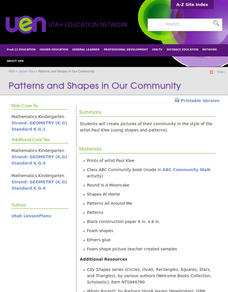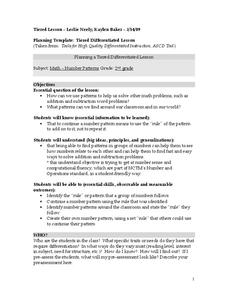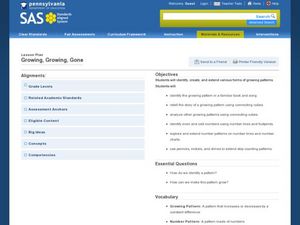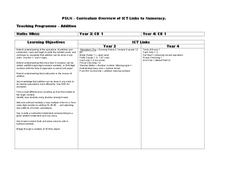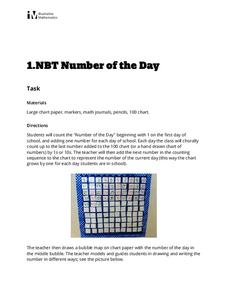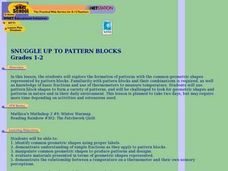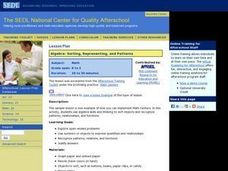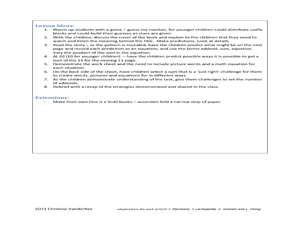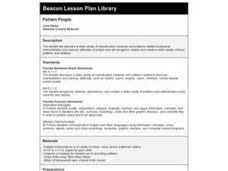Curated OER
Number Patterns
In this number patterns worksheet, 2nd graders write in 16 missing numbers in a number grid and then fill in 4 blanks to complete 4 statements relating to the number grid.
Utah Education Network (UEN)
Patterns and Shapes In Our Community
Shapes in art, shapes in stories, shapes in the environment, shapes all around. A multi-part lesson that includes looking at the artist Paul Klee's work, reading books about shapes, taking a walk in the neighborhood and identifying...
Curated OER
Relate Counting to Addition and Subtraction
Find 10 simple word problems that require addition and subtraction skills. Although these offer clear math procedure, the grammar isn't perfect. The highest number your learners encounter here is 40, and each question has room for...
Curated OER
Number Patterns
Second graders identify number patterns. In this number lesson, 2nd graders find the rule or pattern in a group of numbers and continue the pattern using the rule. They create their own number pattern by making their own rule.
Curated OER
Growing, Growing, Gone
Budding mathematicians identify growing patterns in numbers and songs then create their own patterns. They look at number patterns and language patterns and then create their own using money and footprints.
NTTI
Putting Together Ten
Groups explore sets of 10 items in two varieties (i.e. 3 white buttons and 7 black ones, or 5 bears and 5 bunnies). They brainstorm about their objects, write math sentences to represent what they have, and report their discoveries...
Curated OER
Be Sharp and Never Flat
An outstanding lesson on music awaits your young composers! They learn about patterns found in music, the different sections of an orchestra, and see the differences between musicians and a composer. Excellent streamed videos and good...
Curated OER
Tiling Tessellations
Students explore tessellations. In this shapes and geometry lesson, students describe the attributes of many of the shapes displayed on an Elmo. Students create examples of tessellations using pattern blocks.
Curated OER
Curriculum Links To Numeracy
Youngsters practice looking for the links to numeracy in their classes. This isn't a worksheet but a curriculum guide for an entire unit. Teachers can use any part of the resource to extend or inform their teaching practices related to...
Curated OER
Letter Patterns
Second graders look at the number patterns we get from letters and numbers. They keep track of the numbers involved by drawing up a table of values. It's important here to look for the pattern and see how the number of tiles changes from...
Curated OER
How using number patterns help us add or subtract
Second graders use a number line to understand multiples. In this number line lesson, 2nd graders use a floor size number line and calculate problems with multiples. Students complete a worksheet with multiples.
Curated OER
Representing and Extending Patterns
Young scholars explore repeating and growing patterns. In this patterns lesson, students describe patterns, explore changing patterns and match patterns. Young scholars participate in online activities and read books that show...
Curated OER
The Three Pigs
Second graders design and construct homes for the three pigs. Each of the homes is made and filled with patterns that we explore. They continue a sequential pattern and describe a rule for this.
Curated OER
Connections: Peddling Petals
Students identify various patterns. In this patterns lesson plan, students assemble paper flowers by using patterns. Students discuss how they constructed their flower.
Scholastic
Adding and Subtracting Ten
Developing fluency with basic addition and subtraction is fundamental to the success of all young mathematicians. This four-day lesson series begins with learners using ten-frames and hundreds charts to recognize patterns when adding and...
Alabama Learning Exchange
Introduction to Division
Examine how addition, subtraction, multiplication, and division relate to and are separate from each other. As they listen to the book, The Doorbell Rang, they demonstrate the math described in the story by cutting up paper cookies...
Curated OER
Making Models of the Solar System
Students make several models of the solar system to learn the positions of the planets in the solar system as well as relative distances and sizes. Creation of these models will help them identify the planets by size, shape, color,...
Curated OER
What's in the Bag?
Help your students identify the attributes of two-dimensional shapes. They read the book Round is a Mooncake, and use pattern blocks to sort shapes. Students sort shapes according to their attributes.
Illustrative Mathematics
Building toward fluency
Here is a great learning task that focuses on the development of areas in computational fluency including strategies in mental math. Young learners are guided through a list of addition expressions that help them visually understand the...
Illustrative Mathematics
Number of the Day
Daily routines not only help to manage classrooms, they can also provide learners with rich opportunities for learning. This activity supports young learners in developing their number sense by counting up the school days on a class...
Curated OER
Snuggle Up To Pattern Blocks
Students view and discuss a video about the use of pattern block shapes to form pictures. They, in groups, form garden and quilt designs using pattern blocks and then decorate the room with their art.
Curated OER
Algebra: Sorting, Representing, and Patterns
Students sort objects and create patterns. In this sorting and graphing lesson, students work at centers to find a way to sort a group of objects, then make a graphical representation of the number of each item. Finally, students create...
Curated OER
Book Title: One is a Snail, Ten is a Crab
Students read a story and write math problems. In this reading and math comprehension lesson, students preview and read the book "One is a Snail, Ten is a Crab". Students predict ways to get a sum of 11, write math equations...
Curated OER
Pattern People
Students describe a wide variety of classification schemes and patterns related to physical characteristics and sensory attributes of people. They recognize, extend and create a wide variety of those patterns and relations.

